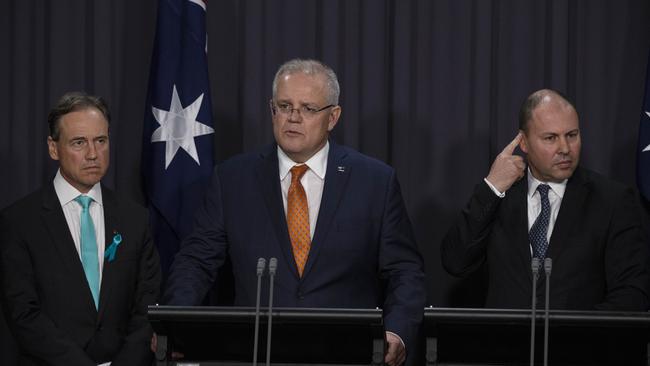Injecting politics into pandemic policy may be disastrous
If ever there was a spotlight on the impotence of our federal government, it is now.

This week for example, Josh Frydenberg and Health Minister Greg Hunt had a bit to say about Victoria. Hunt declared the state had now met the commonwealth threshold to reopen and, as such, restrictions could be eased.
“We have a commonwealth definition in terms of hotspots, that’s a rolling average of less than 10 cases. Victoria is below that rolling average,” he said.
Hunt pointed out that Victoria’s numbers had reached the standard determined by the Chief Medical Officer. “Their simple way forward is the national standard of a rolling average of less than 10 cases and they are there.”
This all sounds very reasonable until we factor in the issue of borders. Melbourne may not be considered a hotspot any more by the feds but unfortunately, on this issue, their opinion counts for nothing. The states and territories have their own definitions of hotspots and they control their borders, which around the nation remained closed to Victoria.
For meaningful assistance on borders, Victorians must pin their hopes on Clive Palmer and his challenge in the High Court against Western Australia. Curiously, the feds decided some time ago not to back this challenge and more recently the Prime Minister even urged Palmer to back off.
So, despite the complaints from sections of the Victorian community against our painful and destructive restrictions, many understand that if we ever want to travel freely around our own country we have to meet the standards set down by the various premiers, and those standards are extremely strict.
The criticism of Victoria has more to do with politics than with anything else, and throughout this crisis many Victorians have been shocked and disappointed at the politics on display.
Politics and the pandemic haven’t mixed well for us; while the red and blue teams bickered, we suffered. Most can see this health crisis for what it is and expected it to be managed without ideology.
To illustrate just how politics and public health policy intersect, we can look to an American libertarian think tank in Massachusetts that issued The Great Barrington Declaration earlier this month.
The declaration is a written statement signed by three infectious disease epidemiologists and public health scientists who have concerns about the damaging impacts of prevailing COVID-19 policies and recommend instead an approach called “focused protection”.
The theory is one that has been proposed by some media commentators for some time now. It advocates for society to identify and protect the vulnerable for a time while letting the economy open up fully so the non-vulnerable can live their lives normally and build up immunity to the virus through naturally acquired infection. When the disease has run its course, the vulnerable then can choose to remain in isolation or take their chances with integration.
Specifically, the declaration says “nursing homes should use staff with acquired immunity and perform frequent PCR (polymerase chain reaction) testing of other staff and all visitors. Staff rotation should be minimised. Retired people living at home should have groceries and other essentials delivered to their home. When possible, they should meet family members outside rather than inside. A comprehensive and detailed list of measures, including approaches to multi-generational households, can be implemented.”
The declaration can be signed online by anyone and thousands have signed it. However, other health professionals have labelled it wishful thinking and containing profound ethical, logistic and scientific flaws. Many point out that in some countries almost half the population are vulnerable to COVID-19.
Speaking to the Science Media Centre, Rupert Beale, who is group leader of the Cell Biology of Infection Laboratory at the Francis Crick Institute in London, said: “It is not possible to fully identify vulnerable individuals and it is not possible to fully isolate them.
“Furthermore, we know that immunity to coronaviruses wanes over time, and reinfection is possible, so lasting protection of vulnerable individuals by establishing herd immunity is very unlikely to be achieved in the absence of a vaccine.”
University of Leeds school of medicine associate professor Stephen Griffin said the declaration was “clearly a well-intentioned movement” but that herd immunity “at best is currently a theoretical concept for SARS-CoV2”.
“Basing risk primarily upon risk of death completely ignores the profound morbidity associated with the pandemic, including what we now term as ‘long COVID’, plus the criteria by which one or more risk factors might predispose towards severe disease remain both uncertain and incredibly diverse,” he said.
Griffin points out that we are all exhausted by the pandemic, but “the dangers of seizing upon dissatisfaction and political failings to support what amounts to little more than an ideology runs the risk of inaction and an ensuing limbo of cyclical epidemic waves of infection for the foreseeable future”.
At present the declaration remains a fringe idea, but as time passes, if a vaccine does not eventuate and future outbreaks occur, support for it may grow.



If ever there was a spotlight on the impotence of our federal government, it is now. Members from Scott Morrison down, in the face of determined actions by the premiers, can only stand by, making suggestions, criticisms and complaints through the media.